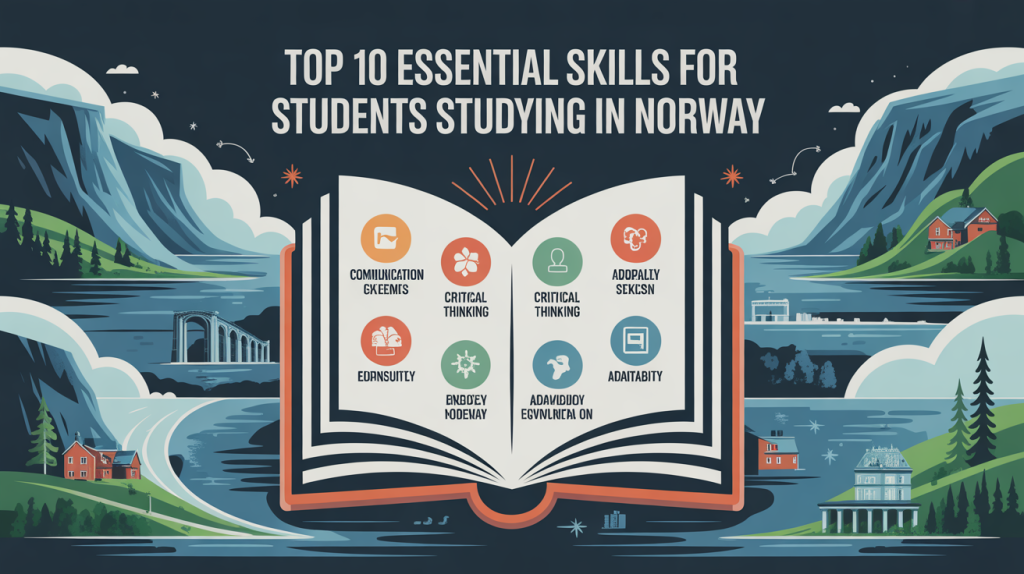Top 10 Must-Have Skills for Students Studying in Norway: A Guide for International Recruiters and Admissions Teams
Why Skills Matter for International Students in Norway
Norwegian higher education is distinctive, with a strong focus on student independence, critical thinking, and cultural integration. While academic excellence remains a priority, students must also navigate new social environments, languages, and digital learning platforms. These challenges highlight the importance of holistic skill development.
The Study in Norway platform is designed to guide students through this journey by emphasizing competencies that support academic success and personal growth. As international recruiters and admissions professionals, aligning admissions criteria with these skill sets can enhance student readiness and satisfaction, ultimately improving retention and graduate outcomes.
Top 10 Essential Skills for Students Studying in Norway
1. Language Proficiency (English and Norwegian)
Language skills are foundational. Although many degree programs in Norway are offered in English, proficiency in both English and basic Norwegian is crucial.
- English mastery: ensures effective participation in coursework, research, and communication with faculty.
- Basic Norwegian skills: support daily interactions, cultural integration, and expand employment or internship opportunities during and after studies.
2. Academic Research and Critical Thinking
Norwegian education highly values independent research and critical analysis.
- Students are expected to engage proactively with academic material, assess various perspectives, and develop evidence-based conclusions.
- Universities emphasize inquiry-based learning methods, promoting autonomy in knowledge acquisition.
3. Adaptability and Cultural Awareness
Adapting to a new culture is key for international students in Norway.
- Students encounter different academic expectations, social norms, and lifestyle habits.
- Developing cultural awareness helps students navigate these differences and fosters personal growth.
4. Time Management and Organization
Balancing studies with social activities and practical obligations requires strong time management.
- Norwegian students often juggle coursework, group projects, part-time jobs, and extracurriculars.
- Effective organizational skills prevent burnout and enhance academic performance.
5. Teamwork and Collaboration
Collaborative learning is the norm in Norway’s higher education.
- Many courses include group assignments requiring students to work with peers from diverse backgrounds.
- Developing effective communication and cooperation skills supports both academic success and future career paths.
6. Problem-Solving Skills
Students regularly face both academic and practical challenges.
- Problem-solving skills enable them to address issues independently and resourcefully.
- This aligns with Norway’s emphasis on innovation and critical thinking in education.
7. Networking and Interpersonal Communication
Building professional and social networks enhances students’ academic and career prospects.
- Connections with peers, faculty, and industry professionals provide support and open doors to opportunities.
- Strong interpersonal skills are essential for effective networking.
8. Self-Motivation and Independence
Norwegian education places high value on student autonomy.
- Students must take responsibility for their learning and development.
- Self-motivated individuals adapt better to the open and flexible learning environment.
9. Digital Literacy
Digital competence is indispensable in modern academic settings.
- Effective use of digital tools for research, collaboration, and presentations is expected.
- Familiarity with online learning platforms facilitates smoother academic engagement, especially as blended education models grow.
10. Sustainability Awareness
Norway is a global leader in sustainability, which is reflected in academia and society.
- Understanding and participating in sustainability practices aligns with the country’s values.
- Many programs integrate environmental responsibility into their curricula and campus life.
How Study in Norway Supports Skill Development
At Study in Norway, our mission is to empower international students not only to access education but to thrive holistically throughout their academic journey. Our platform supports:
- Guidance on academic and cultural skill-building, ensuring students are prepared for Norway’s unique educational landscape.
- Resources and advice on language proficiency, digital literacy, and time management to facilitate integration.
- Connections to universities, exchange programs, and student communities, promoting teamwork, networking, and cultural adaptability.
For international recruiters and university admissions teams, partnering with Study in Norway means access to a trusted platform that prioritizes student-ready skills and comprehensive support.
Actionable Recommendations for Recruiters and Education Professionals
To maximize student success and satisfaction, consider these steps:
- Integrate skill-based assessments and interviews focusing on critical thinking, language ability, and self-motivation.
- Design orientation programs and pre-departure training that hone the identified skills, particularly in language and cultural awareness.
- Leverage digital tools and platforms for ongoing support, including Study in Norway’s online resources.
- Promote sustainability engagement initiatives within your recruitment messaging and university partnerships.
- Establish collaborative networks among recruiters, admissions teams, and education agencies to share best practices and resources aligned with these essential skills.
Conclusion
The journey of an international student in Norway is enriched and streamlined when they possess the right blend of skills spanning academic, social, and personal domains. By focusing on language proficiency, critical thinking, adaptability, and the other competencies outlined above, education professionals and recruiters can enhance recruitment strategies and student support mechanisms.
Study in Norway stands ready to collaborate with international recruiters, admissions teams, and education agencies to ensure students are well-prepared, well-supported, and set up for success. Together, we can elevate the international education experience in Norway.
Take the Next Step with Study in Norway
Ready to empower your students with the skills they need for success in Norway? Contact Study in Norway today to learn how our platform and services can support your recruitment and admissions goals.

